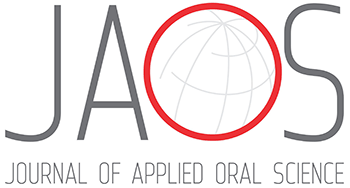Objective
To evaluate the biocompatibility and the setting time of Portland cement clinker with or without 2% or 5% calcium sulfate and MTA-CPM.
Material and Methods
Twenty-four mice (Rattus norvegicus) received subcutaneously polyethylene tubes filled with Portland cement clinker with or without 2% or 5% calcium sulfate and MTA. After 15, 30 and 60 days of implantation, the animals were killed and specimens were prepared for microscopic analysis. For evaluation of the setting time, each material was analyzed using Gilmore needles weighing 113.5 g and 456.5 g, according to the ASTM specification Number C266-08 guideline. Data were analyzed by ANOVA and Tukey's test for setting time and Kruskal-Wallis and Dunn test for biocompatibility at 5% significance level.
Results
Histologic observation showed no statistically significant difference of biocompatibility (p>0.05) among the materials in the subcutaneous tissues. For the setting time, clinker without calcium sulfate showed the shortest initial and final setting times (6.18 s/21.48 s), followed by clinker with 2% calcium sulfate (9.22 s/25.33 s), clinker with 5% calcium sulfate (10.06 s/42.46 s) and MTA (15.01 s/42.46 s).
Conclusions
All the tested materials showed biocompatibility and the calcium sulfate absence shortened the initial and final setting times of the white Portland cement clinker.
Dental material; Calcium sulfate

